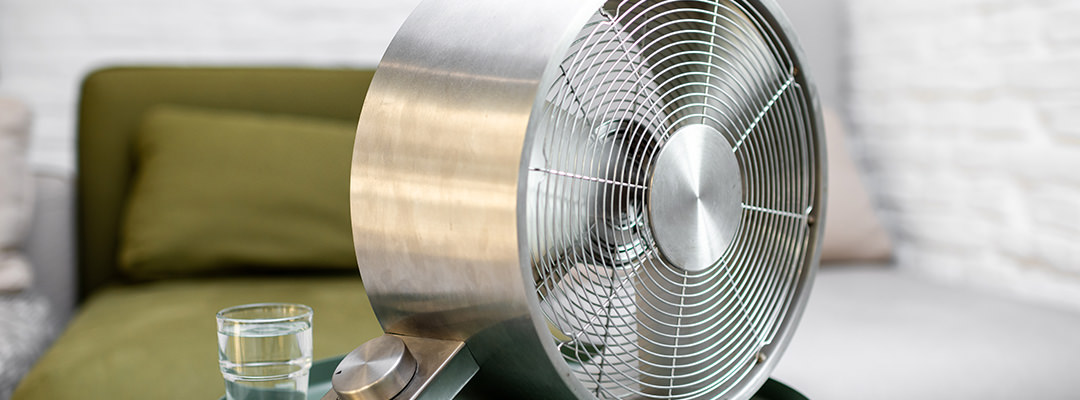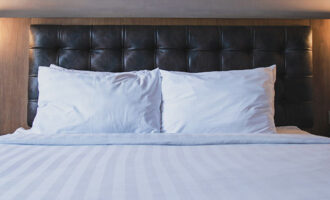For many people, falling asleep with a fan blowing cool air into their face is a pleasant, guilt-free, everyday luxury. Particularly when the temperature begins to rise and you’re stuck in a place with no air conditioning and poor circulation, sleeping with a fan on can be the secret to getting a good night’s rest when you cannot afford a good bed climate control system.
Unfortunately, more and more people are becoming cautious about the adverse health effects of sleeping with a fan. You may have even heard the resurrected old wife’s tale about how sleeping with a fan on can make you ill! So is your favorite bedtime ritual really safe? How can we make sure we’re taking care of ourselves as we sleep? Let’s explore the ups and downs of sleeping in a cold room at night thanks to a good fan.
Benefits of Sleeping With a Fan
Sleeping with a fan gets a lot of love as part of a summer nighttime ritual. Here are some of the great things about sleeping with a fan on at night.
It Cools You Down
This one seems like a no-brainer, but the best thing about fans — and the reason most people turn to them on hot summer nights — is because they keep you cool. Fans are a cheap, surefire way to dial down your body heat. They also keep you from sweating, which limits the amount of moisture in your bedding and helps stave off things like odors and bacteria.
Soothing Background Noise
For many people, silence can be a deterrent to getting to sleep easily. Fans provide a soft, constant white noise that can lull you into a sense of comfort and safety as you sleep. They also help muffle sounds from your neighbors, which is a huge bonus in tightly-packed living spaces.
If you live on a busy street with a lot of traffic or partying at night, you might find that the soft noise from a fan helps you settle down at night easier and more consistently.
Prevents SIDS
What’s less known than some of these is that having a fan on at night can actually reduce the risk of Sudden Infant Death Syndrome in newborn babies. According to a study done back in 2008, having a fan blowing in your baby’s room can actually lower the risk of SIDS by 72%. They think this is down to the improved air circulation (more on that below) and the lack of stagnating CO2 around your baby’s sleep space.
Improves Air Circulation
Stagnant air can be a big problem in tight, confined living spaces. When you have a fan on, you’re creating currents in the room so that you’re not stuck breathing in dead air all night long. The fresh airflow helps you breathe easier and sleep more peacefully.
Improves Sleep Quality
Very often people choose to go to bed with a fan on at night because it helps them get to sleep faster and sleep deeper and more comfortable when they do. Keeping your body temperature down, having soft white noise in the background, and keeping a healthy level of airflow in your sleeping space all contribute to a better quality of sleep.
Risks of Sleeping With a Fan
Now that we’ve looked at the benefits of having a fan on while you sleep, let’s compare with some of the things that are not so great.
Dry Skin and Eyes
Having a constant blast of air pointed at your face can be really damaging for your skin. For people who sleep with their eyes partially open, or whose eyelids shutter a bit as they dream, the harsh air can also strip your eyes of moisture. This is unpleasant for anyone but especially for people who have chronic skin issues or very sensitive skin.
Allergic Reactions
The airflow from a fan also picks up a lot of dust, grime, and pollen that’s been left to settle in your sleeping space throughout the day. For people with allergies, asthma, or hay fever, having these particles floating through the air can trigger uncomfortable reactions such as sneezing, coughing, or irritated eyes.
Nasal Congestion
When your mouth and eyes begin to dry out, your sinuses can often begin overproducing mucus in a clumsy attempt to rehydrate. If you’re experiencing allergic reactions from your fan or if you’re already under the weather, the drying effects of the harsh air circulation can make your symptoms even worse.
Aching Muscles
When you’re asleep, a constant stream of cold air can cause your body to tense up. Over an extended period of several hours, this tension can be really tough on your body. This is why, after sleeping with a fan on, you might wake up with sore muscles in your arms, legs, or neck.
Other Ways to Keep Cool at Night
If you’re worried about allergens, dry eyes, or muscle aches, you might want to think about other ways to keep your body cool at night. Here are a few alternatives to keep in mind.
Create Air Circulation
Fans are great for air circulation in your room, but you can also get air flowing by making sure that you have open spaces leading into and out of the bedroom. For instance, leave your windows open as well as the door to another room to make sure the stagnant air in your space can pass in and out.
Use Lightweight Bedding
Some people can’t imagine trying to get to sleep without something covering them up. If that’s you, don’t forget that you’re not limited to heavy winter blankets — a thin cotton or linen sheet can be just as comfortable while allowing more cool air to flow through it on those hot summer nights.
Sleep With a Cool Water Bottle
Bedtime water bottles are often things we associate with the frigid winter months, but we can also use them in summer. Fill your water bottle with briskly cold tap water or water that’s been refrigerated and leave it under your blanket near your feet. This will help keep you cool even on the most sweltering of evenings.
Try a Cooling Mattress Pad
These days you can actually get mattress pads designed to keep your body temperature down. These can be electric blankets with active cooling systems, thin mattresses with built-in cooling fans, or soft pads made from fabrics designed to release rather than store body heat.
Some mattresses, such as memory foam, are notorious for trapping the heat your body produces while it sleeps; if you find you’re having trouble sleeping or are waking up way too hot, try a blanket or mattress pad specially made to keep you at a cooler temperature.
What Kind of Fan Is Best for Sleep?
As you can see, there are benefits to sleeping with a fan as well as drawbacks. If you find that having one has a positive impact on your ability to sleep, make sure you get one with a revolving function so that the cold air is being evenly dispersed and isn’t slamming your skin for the entire night.
Also, consider looking for a fan with a timer function; that way you can set it for an hour or two to help you get to sleep, then turn it off so you don’t dry out your skin or cause too much tension in your muscles.
When you do keep a fan on for the night, try to keep it on a lower setting. You can pair this with any of the alternative methods we suggested above such as a lightweight summer blanket or a clear air passageway through your open windows and doors.
By keeping your fan low, light, and constantly moving, you get all the benefits of the cool air and increased circulation in a softer, gentler way.
Did you like it?4.4/5 (24)





